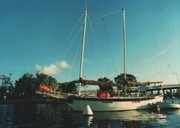Dundalk was not long out of the depression. The town was still feeling its effects but was to some degree feeling prosperous. People had money to spend and could have spent a lot more than they did. We kids were daily treated to the wisdom that at any time the bottom could fall out and the horror stories of many that had lost everything and without care it could be our families at a time in the near future. The use of credit would have pushed things along faster and there was now plenty available. There were few takers though.
Across from the Dundalk streetcar stop was Dundalk Taxi Cab Company owned By mister Graff. Next door was Jimmy Mark's Boiling Ally. A lot of teenage boys set up pins here Those long boys with big hands did very well. If they were fast enough the tips would slid down the alleys. These kids worked till midnight on bolling league nights. Teachers were somewhat understanding about their homework and the fact that they often dozed off in class. Many of the boys were from immagent families who came to this country without a trade to work at. They were the first hit by the depression and the last to recover. In some cases that bolling ally money was needed by the family. All us boys were treated to the saying "Learn a trade be somebody and you will never be out of work." It worked for me. I doubt it was true but some said the bowling ally was built in a marsh and that they drove five thousand pileings to set it on. Like most tales of this nature there were probably some pilings underneath the place.
In the next block was Dundalk Hardware. To paint a house many people who did not trust canned paint, would buy ten pounds of white lead, a gallon, of boiled linseed oil, and a little turpentine along with that a quarter pint of Japan dryers. All mixed together you had a fine coat of paint that killed rot, fungus, bugs, germs and children if they ate it. I don't think any kids I knew ate paint, we ate food. We did chew tar. Gosh! Who knows why, it didn't taste like much. Seems I remember that it was good for your teeth. Now there teeth was something some of the kids could have used some help with. They had green teeth, I guess from a lack of brushing.
There were local town rivalries, that I think were inspired by baseball. Dundalk and every town around had a ball team. In Dundalk ball games were always played on the diamond at the school. Spirits ran high and nearly the whole town attended. It seemed every kid in town had a desire to climb the backstop. There was usually a policeman standing at it's back who could with one knot raising smack across. your calves, keep a fellow off of there for the rest of the day.
Dundalk had the nicest tennis courts around. There were three or four red clay courts all fenced about ten feet high. It was a strange thing, the boys all thought it was a girls game. Boys hung around but never played. Our next door neighbor Otts Mc Clelland got so angry when they asphalted over the red clay tennis courts he built his own and envited everyone to play on his courts, many did
Dundalk Bathing beach was the local place to go for a swim. It's local name was Snake Hole. Just around the bend was a marsh and snakes on occasion came from there. There was some truth, that on occasion, a snake would swim right through the middle of the place creating quite a stir among the swimmers. The beach was owned or run by Don Might and was really quite nice with picnic tables, and grassy areas that were dotted with thorny trees with white washed trunks. You didn't climb them!
Don was the only prominent man in town that the kids called by his first name. Don was short but built like a small bulldozer. He was an ex professional wrestler at a time when they really competed. You could pick him out in a crowd. Wih a neck, as big as his head and a barrel chest with long muscular arms. He walked with his own pecular gate that had a way of looking mennacing. A mark of a wrestler was coliflour ears and he had'em. His body was covered with red hair and I don't think his red head ever got wet it shed water like a duck. Now here was a fellow that ran a pretty tight ship. His gravelly voice over a megaphone was usually enough to command respect. Sometimes someone would try him but he usually just called the police. Across the creak from the beach was a place called HOLIDAY PARK. Sometime before the war It became part of the Maryland orphanage system. A large side wheel steamboat named Ann Arundel would come in there and spend the day and hundreds of orphans would get off to swim and play. You could see they were having a good time. It also made a boy or girl glad he had his Parents.
Maybe someone can correct me on these names I think they are correct but I wouldn't bet the farm on it.







